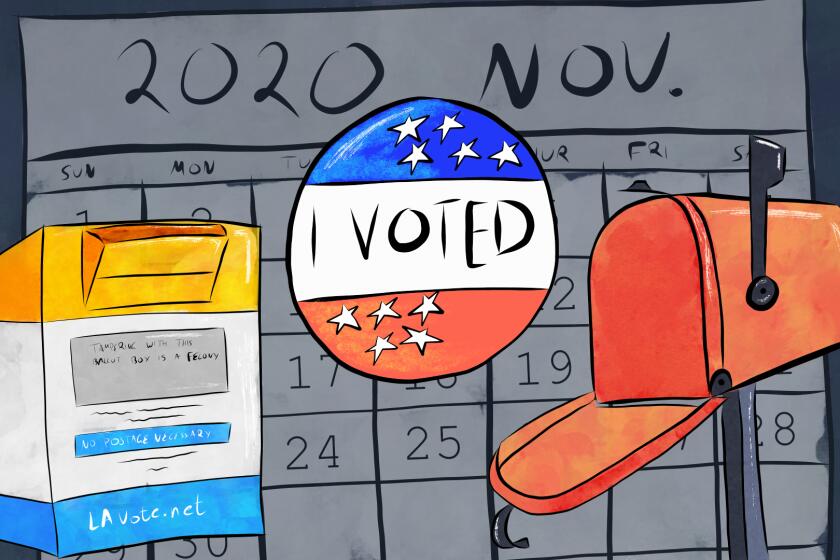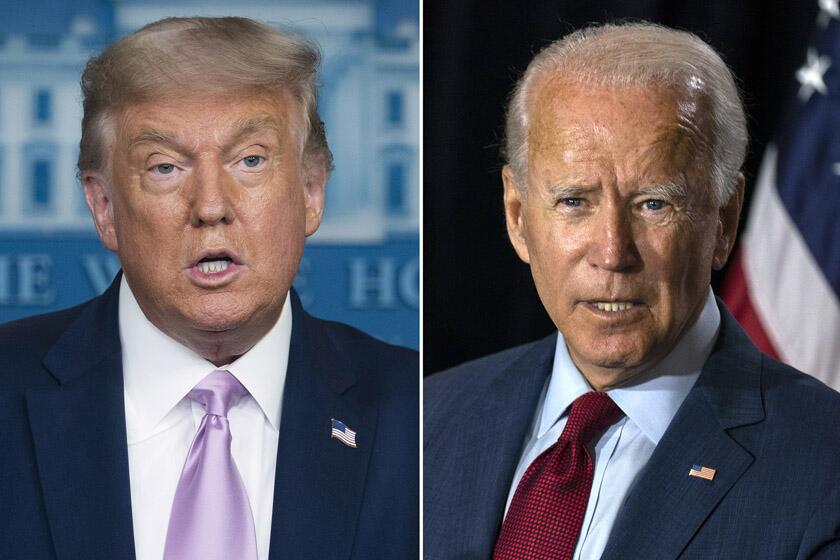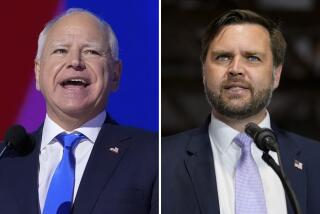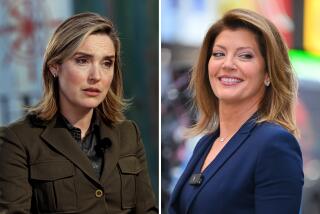Trump has been attacking the presidential debate commission. What is it and how did it come about?
- Share via
The closing weeks of the 2020 presidential election have been shot through by controversy over when and how the two main candidates will meet and debate. Right in the middle of that controversy is the Commission on Presidential Debates, a little-known nonprofit that has managed the matchups for decades.
The second and final bout between Republican President Trump and Democratic nominee Joe Biden is set for Thursday night in Nashville. (What was supposed to be the second debate on Oct. 15 was canceled when Trump refused to participate in a virtual event after his hospitalization with COVID-19.) The commission drew headlines Monday for its decision to mute each candidate during the other’s opening remarks after Trump repeatedly interrupted Biden at the first debate, a matchup many commentators regarded as one of the ugliest they’d seen.
Here’s what you need to know about the commission and how it emerged.
Do the presidential candidates have to debate?
No. It’s not like it’s written in the Constitution anywhere, and it’s not even a skill presidents really need — they don’t govern by debating the speaker of the House on television, with a journalist refereeing. Debates are a relatively new thing in the long history of U.S. presidential campaigns, largely corresponding with the rise of television as a mass medium. And the best explanation for why they happen is that tens of millions of people watch them, and unlike with ads, the candidates don’t have to pay anything to get those eyeballs.
The first general-election debates were held on television between then-Vice President Richard Nixon and Democratic presidential nominee Sen. John F. Kennedy in 1960. You’ve probably heard the story about how Nixon looked terrible in the first debate compared with the telegenic Kennedy because he refused to wear makeup for TV. You may not know that there were three other Nixon-Kennedy debates that year, including one in which both candidates appeared remotely.
But the major parties’ candidates did not spar again until 1976 (Republican President Ford versus Democratic challenger Jimmy Carter), after which point debates have happened every election cycle.
Did the Commission on Presidential Debates always run debates?
No. Starting with the 1976 debates, that role was initially held by the nonpartisan League of Women Voters, one of the nation’s oldest and most famous voter-outreach groups. And the reason the league doesn’t host presidential debates anymore is because the Democratic and Republican parties decided that the group was a little too independent for their tastes.
Then-President Carter refused to appear at one 1980 debate because the league invited independent candidate John B. Anderson, whose candidacy was seen to pose more of a threat to Carter than to Republican challenger Ronald Reagan (who later beat Carter).
In 1984, Frank J. Fahrenkopf Jr., then-chairman of the Republican National Committee, said that joint Republican and Democratic sponsorship of the presidential debates would be preferable, because “the two major political parties should do everything in their power to strengthen their own position.”
In 1987, as the parties moved to take more control of the debates from the League of Women Voters, then-Democratic National Committee Chairman Paul G. Kirk likened the situation to “a little boy whose sister did his homework.... That can’t go on forever.”
Thus was the Commission on Presidential Debates born before the 1988 election with the sponsorship of the two major parties.
How did the League of Women Voters respond to the two parties taking control?
It wasn’t happy about how things went down. The League of Women Voters angrily withdrew its sponsorship of one of the 1988 presidential debates after the Democratic and Republican campaigns negotiated their own ground rules without the league’s input in a way that appeared designed to minimize risk or spontaneity by the candidates.
“It has become clear to us that the candidates’ organizations aim to add debates to their list of campaign-trail charades devoid of substance, spontaneity and honest answers to tough questions,” league President Nancy M. Neuman said in a statement at the time. “The League has no intention of becoming an accessory to the hoodwinking of the American public.”
That was the end of the league hosting presidential debates. The new, major-party-sponsored Commission on Presidential Debates would serve that role for the next three decades and continues today.
How does the Commission on Presidential Debates work?
It’s a 501(c)3 nonprofit and says it does not receive any funding from the government or political groups.
The commission says on its website that “in the intervening 30 years, no sitting officer of either major party has had any affiliation with the CPD, and the major parties have no role whatsoever in running the CPD or setting its policies.” The commission picks the moderators but says the moderators pick their own questions, and do not show the questions to either the commission or the candidates.
In the past, the two major parties’ candidates have reportedly negotiated secret memorandums of understanding to set the ground rules of the debates, though the Washington Post recently reported that no such agreement exists in 2020.
Why don’t third-party candidates appear in more presidential debates?
The quick answer is that apart from Ross Perot in 1992, third-party candidates almost never poll high enough to meet the debate commission’s 15% polling qualification standard. So cycle after cycle, it’s a Democrat and a Republican on the debate stage. But they are, of course, not the only presidential candidates who exist, and they are certainly not the only candidates who win Americans’ votes.
Over the decades, groups including the Green and Libertarian parties have filed multiple legal challenges against the Commission on Presidential Debates, deploying various legal arguments that basically say the same thing: The debate process is exclusionary of third-party candidates, and therefore structurally biased to favor the Democratic and Republican parties. One recent federal lawsuit backed by both the Libertarian and Green parties called it a “bipartisan bias.”
But neither the courts nor the Federal Election Commission have been receptive to those challenges. In a U.S. Court of Appeals ruling in the District of Columbia in June, the court denied a request to force the Federal Election Commission to scrutinize the Commission on Presidential Debates more rigorously, writing, “There is no legal requirement that the [Federal Election] Commission make it easier for independent candidates to run for President of the United States.”
The court argued that the Commission on Presidential Debates’ partisan origins became less important over time as the organization matured into an independent entity, albeit one dominated by familiar Republican and Democratic figures.
Who serves on the commission now?
The commission’s board is led by three co-chairs: Fahrenkopf, Dorothy S. Ridings and Kenneth Wollack.
After leaving the RNC in 1989, Fahrenkopf was a lobbyist for the American casino industry between 1995 and 2013. Ridings is a former journalist and former president of the League of Women Voters. Wollack served as an executive for the National Democratic Institute between 1986 and 2018, and previously was a legislative director for the American Israel Public Affairs Committee and wrote about foreign affairs for the Los Angeles Times.
The board, which includes a mix of Republicans, Democrats and journalists, also includes former Sens. John C. Danforth (R-Mo.) and Olympia Snowe (R-Maine); former U.S. Rep. Jane Harman (D-Venice); former ABC News anchor Charles Gibson; John Griffen, managing director of investment bank Allen & Co.; Yvonne Hao, managing director of Cove Hill Partners, a private-equity firm; Antonia Hernandez, president and chief executive of the California Community Foundation, a philanthropy; the Rev. John I. Jenkins, president of Notre Dame University, who recently contracted COVID-19 after visiting the White House without a mask; Newton N. Minow, attorney and former chair of the Federal Communications Commission; and Richard D. Parsons, former CEO and chairman of Time Warner.
The commission’s executive director is Janet H. Brown, who has served in that role since the commission’s founding in 1987.
A look at where President Trump and Joe Biden stand on key issues in the 2020 election, including healthcare, immigration, police reform and climate.
More to Read
Get the L.A. Times Politics newsletter
Deeply reported insights into legislation, politics and policy from Sacramento, Washington and beyond. In your inbox three times per week.
You may occasionally receive promotional content from the Los Angeles Times.













